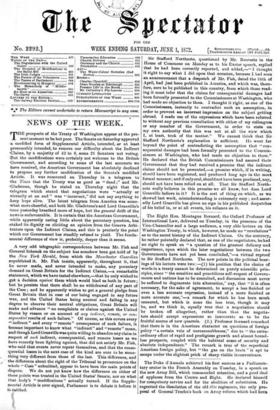Sir Stafford Northcote, questioned by Mr. Bouverie in the House
of Commons on Monday as to his Exeter speech, replied that he had been correctly reported, and added,—" I thought it right to say what I did upon that occasion, because I had seen an announcement that a despatch of Mr. Fish, dated the 16th of April, had just been published in America, and which was, there- fore, sure to be published in this country, from which those read- ing it must infer that the claims for consequential damages had been formally presented to the Commissioners at Washington, who had made no objection to them. I thought it right, as one of the Commissioners, instantly to contradict such an assumption, in order to prevent an incorrect impression on the subject getting abroad. I made use of the expressions which have been referred to without any previous consultation with either of my colleagues or any member of the Government, in order to state on my own authority that this was not at all the view which I, at least, took of the matter." We cannot think that Sir Stafford Northcote's explanation is sufficient. He went far beyond the point of contradicting the assumption that "con- sequential damages had been formally presented to the Commis- sioners at Washington, who had made no objection to them." He declared that the British Commissioners had assured their Government that they had received a promise that the indirect claims should not be presented,—a promise which, if in writing, should have been registered, and produced long ago in the most formal manner; and if onlyoral, should not have been produced, nay, should not have been relied on at all. That Sir Stafford North- cote really believes in this promise we all know, but does Lord Granville believe in it? It is the sort of thing on which, as we showed last week, misunderstanding is extremely easy ; and assur- edly Lord Granville has given no sign in his published despatchea of his belief in, or at all events, his reliance on it.


































